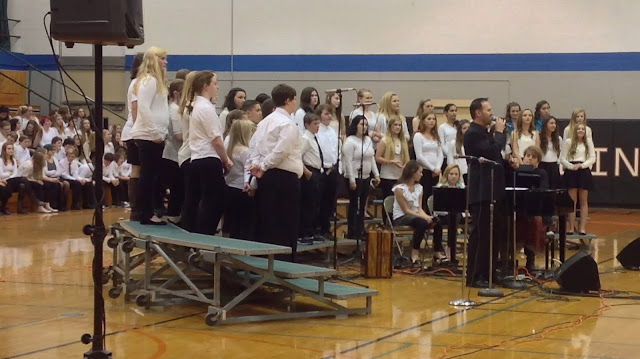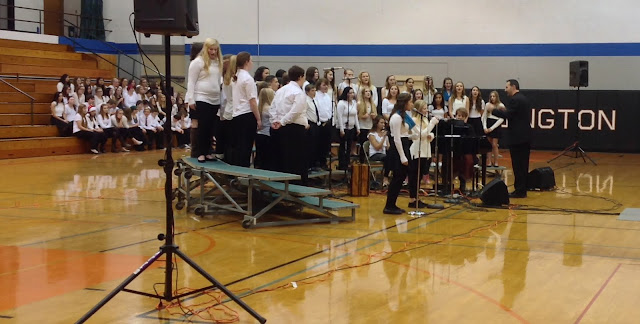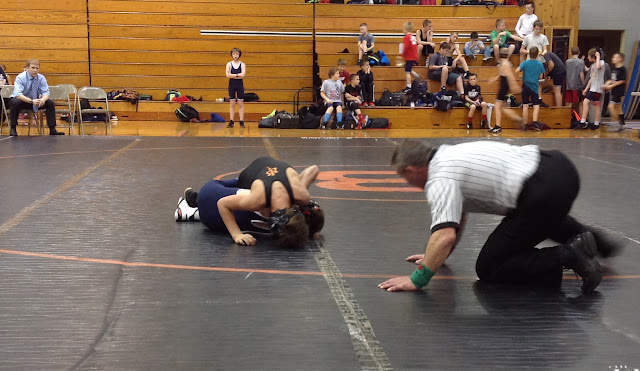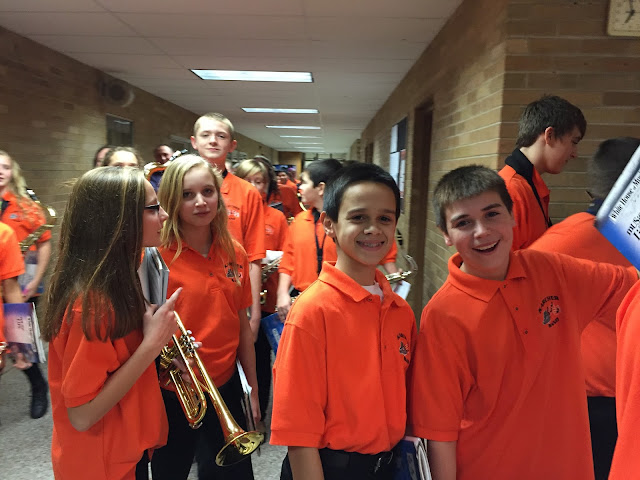KARCHER STAFF BLOG
Karcher Character Students of the Week
All 6 of these students displayed positive character behaviors within our 8 focused traits:
Be... responsible, respectful, kind, safe, honest, loyal, compassionate, courageous.
Students: (left to right)
Literacy Lesson: Connections... look at the quality of all the lessons within EVERYONE'S classroom this week! Kudos to everyone for working hard and embracing the need to focus on literacy as a school.

Choir Concert with Mr. Stoughton and the 7th and 8th grade Choir students. What a GREAT performance!!!




Combined 7th and 8th grade students.
Combined 7th, 8th, and alumni students singing Silent Night.

The wrestling team dominated this past Monday night! Great job to the coaches and student athletes.




Video:
How will you serve the world in 2015?
- Bridi Allen (Hive)
- She has demonstrated "The Karcher Way" through her responsibility in assisting with projects and kindness with a speaker donation to the science department.
- Katie Rebollar (Applied Academics)
- She has demonstrated kindness and a positive attitude everyday in class. She also has been an active and helpful member in her group project in STEM class.
- Tessa Teberg (Diamond)
- She is a student who represents "The Karcher Way" everyday. She is kind and compassionate to her peers inside and outside the classroom.
- Cheyanne Hammiller (Onyx)
- She consistently displays "The Karcher Way" through her actions and attitude. She goes above and beyond when it comes to being considerate and helpful.
- Morgan Hannen (Karcher Bucks)
- She does a great job advocating for herself and taking charge of her academic learning. She comes to class highly focused and ready to learn. She always has a positive mindset even when the material may be difficult.
- Katie Harris (Silver)
- She is always going above and beyond and shared information about her amazing, historic, Underground Railroad Station house.
______________________________________________________________________________
Kudos
_____________________________________________________________________________________________________
- Jennifer Pelnar was chosen as the KCB STAFF OF THE WEEK! Congrats Jennifer and thank you all for continuing to reinforce our 8 character traits.
- Thank you to the following staff who have stepped up to the plate to assist with Friday's afternoon activities:
- 7th grade lunch duty- Ashley Parr, Grace Jorgensen, Barb Berezowitz, and Jacob Malewicki (lunch detention room)
- 8th grade lunch duty- Kurt Rummler, Mike Jones, Sue Bekken, and Alyssa Riggs (lunch detention room)
- And for the basketball game...
- Referees: Hans Block and Matt Behringer
- Players: Mike Jones, Grace Jorgenson, Brad Ferstenou, Jack Schmidt, Kurt Rummler, Jake Malewicki, Faith Trow, Barb Berezowitz, Stacy Stoughton, Jayme Pruszka, Rod Stoughton, Donna Sturdevant, Steve Berezowitz, and bench warmer Stephanie Rummler.
- Thank you Marian Hancock for taking on the role of ESL testing administrator for all of our ACCESS tests! We really appreciate your assistance and willingness to help!
- Remember... any time you feel someone is really stepping up and taking on a leadership role you can ask Kim for an "Acting like a goose" card and write them a little thank you for their leadership.
______________________________________________________________________________
Reminders
__________________________________________________________________________________________________________________________
- BLT Meeting Monday in the library @ 2:40.
- Literacy Lesson this week: Vocabulary
- Wednesdays PLC - Standards/Common Assessment Document.
- Special Education teachers, Wendy Zeman, and Molly Ebbers - reminder your PLC is at Dyer to discuss intervention criteria with Dyer staff. I will be in attendance as well.
- ESL Testing is continuing this week in the library with Marian Hancock - please check emails from Marian regarding which students to send.
- KCB Lunch Rewards on Wednesday. Encourage students to use their KCBs for items at lunch!!!
- Dress up days from the student counsel students for this week. Teachers that dress up will benefit their advisory!!! Students can wear hats if it relates to the theme of the day.
- Monday - White and Blue
- Tuesday - Red and Green
- Wednesday - Dress up in anything holiday (present, tree, etc)
- Thursday - Ugly sweater
- Friday - Pajama Day (can wear slippers)
Looking ahead (after Christmas break)
- Applied Academic meeting in the library @ 2:40 on January 5th.
- PLCs on the 6th - Standards/Common Assessment Document
- MAP Testing begins on January 5th - see the google calendar for grade levels, etc. Marian also sent out a MAP testing schedule via email.
- January 11th week is Huddle Time in advisory - we are really approaching the end of first semester. Please make sure contacts to parents are occurring with anyone you have concerns with.
- Next FNL is January 15th. Please email Mike Jones and Matt Behringer if you are able to help. FNL is from 6:00 to 8:00pm.
______________________________________________________________________________
Pictures from the week
_____________________________________________________________________________________________________

Choir Concert with Mr. Stoughton and the 7th and 8th grade Choir students. What a GREAT performance!!!




Combined 7th and 8th grade students.
Combined 7th, 8th, and alumni students singing Silent Night.





Video:
How will you serve the world in 2015?
Article of the week: Continuation from last weeks article...
Chapter 1. Learning, or Not Learning, in School
Better Learning Through Structured Teaching: A Framework for the Gradual Release of Responsibility, 2nd Edition
Focused Instruction
Focused instruction is an important part of the overall lesson design. This phase includes establishing a clear lesson purpose. We use the word purpose rather than goal, objective, or learning target because it's essential to ensure that students grasp the relevance of the lesson. The statement of a lesson's purpose can address goals related to content, language, and social aspects. Consider, for example, the teacher who clearly communicates the purpose of a lesson as follows:
Our content goal today is to multiply and estimate products of fractions and mixed numerals because these are used in cooking, construction, and medicine. Our language goal for today is to use precise mathematical terminology while discussing problems and answers with one another. Our social goal today is to improve our turn-taking skills by making sure that each member of the group has a chance to participate in the discussion.
As Dick, Carey, and Carey (2001) remind us, an "instructional goal is (1) a clear, general statement of learner outcomes, (2) related to an identified problem and needs assessment, and (3) achievable through instruction" (p. 25). These are important considerations when establishing lesson purpose. As we will discuss further in Chapter 2, it's not enough to simply state the lesson purpose. We must ensure that students have opportunities to engage with the purpose in a meaningful way and obtain feedback about their performance.
In addition to establishing purpose, the focused instruction phase of learning provides students with information about the ways in which a skilled reader, writer, or thinker processes the information under discussion. Typically, this is done through direct explanations, modeling, or think-alouds in which the teacher demonstrates the kind of thinking required to solve a problem, understand a set of directions, or interact with a text. For example, after reading aloud a passage about spiders to 3rd graders, a teacher might say:
Now I have even more questions. I just read that spiders don't have mouth parts, so I'm wondering how they eat. I can't really visualize that, and I will definitely have to look for more information to answer that question. I didn't know that spiders are found all over the world—that was interesting to find out. To me, the most interesting spider mentioned in this text is the one that lives underwater in silken domes. Now, that is something I need to know more about.
Focused instruction is typically done with the whole class and usually lasts 15 minutes or less—long enough to clearly establish purpose and ensure that students have a model from which to work. Note that focused instruction does not have to come at the beginning of the lesson, nor is there any reason to limit focused instruction to once per lesson. The gradual release of responsibility instructional framework is recursive, and a teacher might reassume responsibility several times during a lesson to reestablish its purpose and provide additional examples of expert thinking.










































